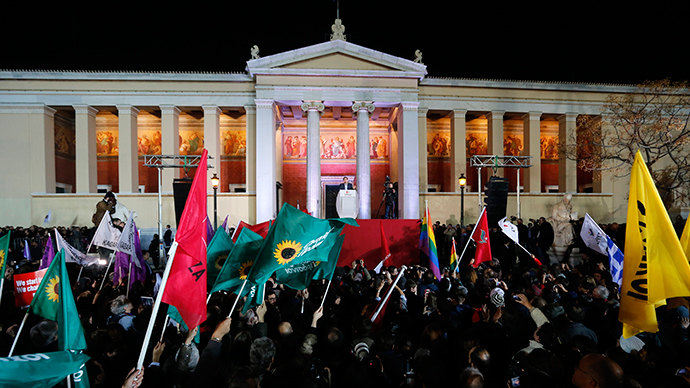‘€12bn black hole in Greece: Where Syriza will get money from?’

The mew Greek Syriza government has failed to explain where it will get the money from to end the austerity policy, as it is impossible to wave a magic wand overnight and fix the problems easily, economist Nick Skrekas told RT.
READ MORE: ‘5yrs of humiliation, suffering over’: Anti-austerity party to form govt in Greece
RT:The Greek economy is in a dire state. Can any party actually change that?
Nick Skrekas: Absolutely. There are great big differences between the two parties. Syriza of course is talking about spending, is talking about increasing wages, and increasing pensions. On the other side the conservative, Nea Democratia, are talking about more structural reforms and more privatization. It couldn’t be more black and white in terms of the way they look at things. However, what I think most Greeks will agree on is the debt is unsustainable. And with this magnitude to the victory for Syriza they have an absolute mandate to go to Europe and demand a debt reduction.
RT:Of course any recovery in Greece won't happen easily. How harmful could the process be for the Greek people?
NS: Yes, that is not far from its scenario. Things will be difficult. This new government of Syriza won’t be able to wave a magic wand overnight and fix everything easily…There is maybe quite a bit of pain installed if that eventuality happens.
RT:Where will Syriza get the money to put an end to the austerity policies?
NS: This is an answer that they haven’t given to anybody. In fact, according to their own program and estimates there is about a €12 billion black hole in what they can actually collect and what they want to spend. They haven’t explained to anyone of us how they are going to find that money and it is a rather sizable sum. You can’t go to Europe and at the same time ask for a debt haircut as well as €12 billion extra for your social policies.

‘EU seems ready to negotiate with Syriza, but with a hard hand’
Panagiotis Sotiris from the University of the Aegean also commented on recent elections in Greece.
RT:Now we know that Syriza got a majority in the Greek parliament. How dramatic do you think the changes will be for Greece and its relations with the EU?
Panagiotis Sotiris: This is something to see in the next weeks and months. It is true that it is a very big political change in terms of the political landscape. It’s a very important victory for Syriza. …they will not have to share power with anyone else.
But that is when all the difficulties come because although the Syriza leadership has tried to present a more realist face of an attempt to negotiate with the EU and to austerity policies, it is obvious that Greece has changed, the EU hasn’t changed yet. And this is the main question: how this negotiation is going to evolve, is it going to be easy, is the EU ready to make concessions or, on the other hand, it is going to blackmail the Greek government into accepting some form of austerity, some form of continuation of the same policies that brought us to this catastrophe. This is also a testing ground for Syriza itself because it has pledged that it can get Greek society to get rid of austerity, put an end to austerity, but at the same time remaining within the institutional framework of the eurozone and within some form of repayment of the debt ... This is a challenge indeed.
RT:Syriza is promising to put an end to austerity policies. That is an expensive thing to do, isn’t it? Where will the money for that come from?
PS: Syriza says that it can get the necessary funding for an end to austerity through a process of debt restructuring and changing the tax system and some form of redistribution of wealth. They have pledged their hopes on the possibility of a wider change in the EU, a wind of change, as they said in the EU, and I think this is the most difficult part for them.
Until now the EU seems to be ready to negotiate with Syriza, but to negotiate with a hard hand, to negotiate an attempt to get some sort of continuation with policies that have been implemented until now. For example, Mr. [Mario] Draghi pledged that Greece can be part of the new quantitative easing (QE) policies of the EU Central Bank but it has to get a positive evaluation in terms of its policies which in EU language means austerity policy. I insist this is a difficult part especially in terms of the debt and especially in terms of the dependence of Greece upon EU for both liquidity and funding.
The statements, views and opinions expressed in this column are solely those of the author and do not necessarily represent those of RT.
The statements, views and opinions expressed in this column are solely those of the author and do not necessarily represent those of RT.












